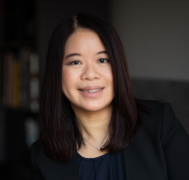I am speaking now
“Everyone’s voice matters, but I am speaking now.”

Each of us have our own superpower. Find it. Embrace it.
The recent viral clip of US Vice President Kamala Harris addressing the crowd at a rally in Michigan reminded me of her debate with then Vice President Mike Pence in 2020.
After being interrupted multiple times by Pence, Harris simply said: “Mr Vice President, I am speaking.”
Many of us are no stranger to being interrupted or talked over, especially in our industry where men’s voices still dominate at the executive level and at networking events. While more than half of all US bank employees are women, only 7.5% of banks are led by women CEOs, according to the American Bankers Association.
There is also a considerable variation in the share of women in executive and senior roles, ranging from 41.9% (Wells Fargo) to 25.9% (Goldman Sachs), according to data from Statista.
Gender inequity has long been a challenge in our society. According to the World Economic Forum, the global gender gap score in 2024 stands at 68.5%, which is essentially unchanged, compared to 68.6% last year. Leadership positions remain narrowly accessible for women: while women occupy almost half of all entry-level positions globally, they fall short of representing just one-quarter of C-suite roles. And the ascent to leadership positions has dropped to below 2021 levels.
At the current rate, it will take another 134 years before we can reach global gender parity. In other words: 2158. That is, if we don’t go backwards.
The outlook for North America is equally dim. We have made virtually no progress in closing the economic gender gap since 2006.
Sadly, I am not surprised.
Finding my superpower
I was chatting with someone at a networking event recently and our conversation, which was centred around financial security and longevity, took an interesting turn when he asked me about my opinion on affordable healthcare. For those who know me, you will likely know how I responded.
Perhaps unsurprisingly, he interrupted and proceeded to explain to me the reasons behind Americans’ shorter life span compared to Asians (e.g. Japanese). I will spare you the details of his words, but he made a point to say that people who suffer from poor health simply do not deserve to be covered.
However, instead of arguing with him, which I would have done in my younger days, I simply walked away. Not because I agreed with him — far from it; I thought his attitude was insulting to say the least. But I have long concluded that my job is not to convince the one privileged person who is already set in his own ways.
Instead, I have found a better way to state my case and on my own terms. After our exchange, I went on to deliver a keynote on financial inclusion, the relationship between health and wealth, and our shared responsibility on uplifting communities outside of our circles.
As Steve Jobs once said: “Don’t let the noise of others’ opinions drown out your inner voice.”
Right there and then, I finally understood what my superpower has been all along: my voice.
I did not need validation. Because at that moment, I was on stage.
And I was speaking.
 About the author
About the author
Theodora Lau is the founder of Unconventional Ventures, a public speaker, and an advisor. She is the co-author of The Metaverse Economy (2023) and Beyond Good (2021), and host of One Vision, a podcast on fintech and innovation. She was named one of American Banker’s Most Influential Women in FinTech in 2023. She is also a regular contributor and commentator for top industry events and publications, including BBC News and Finovate. All opinions are her own – feel free to debate and comment below!











































